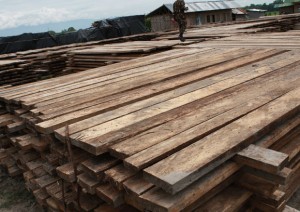LUCENA CITY, Philippines – Coconut lumber traders here have been having brisk business from storm victims who want their houses immediately repaired after the wrecking done by Typhoon “Glenda” (Rammasun).
“Business is good because there are lots of destroyed houses. Our lumber is much cheaper compared to the prices of commercial lumber,” said an owner a coconut lumber store here who requested anonymity, candidly admitting fear of a tax audit by the BIR.
Ironically, the coconut lumber being sold here was obtained from Tacloban, another place, which was badly hit by Typhoon “Yolanda” (Haiyan) in 2013.
“Cutting coconut tree into lumber is prohibited in Quezon,” the store owner said.
He noted that as soon as the typhoon left this city early morning Wednesday, he was forced to open his store to accommodate the throng of waiting typhoon victims.
“One of the victims even fetched me at my house and insisted that I open my store,” he said with a laugh.
He said he was surprised by the sight of a big group of waiting buyers.
Until Thursday morning, coconut lumber buyers continued to form a bee line to the rows of wood store here.
“I can’t afford the price of commercial (lumber) which is too steep for an ordinary government worker like me,” said Angelo Perez whose one-story wooden house was toppled by the strong winds.
A board foot of coconut lumber sells for P15 compared to P75 price of the commercial lumber.
But the coconut lumber trader said he would be forced to add a few pesos to his price due to the extra cost of hiring power saw machines and operator to cut the wood into smaller cuts.
He said most buyers preferred 2”x2” and 2”x3” lumber cuts.
“I could not operate my cutting machine due to lack of electricity. Hiring power saw entails added production cost,” he explained.
Meanwhile, some enterprising typhoon victims were also gathering typhoon garbage to turn them into cash.
Mario de la Paz, a construction worker, said he looked at the fallen trees as potential source of extra income.
With his saw, ax and sharp bolo, De la Paz cut branches of fallen trees scattered along the road and cut them into firewood pieces.
“After a few days and some sun-drying, the fire woods are ready for sale in the neighborhood,” he said with a smile.
Tomas Veloso, a street junk collector, said as soon as Glenda left Lucena, he and his two sons started to search for cashable trash and typhoon left-overs.
“There were lots of scattered iron sheets in the street blown by the strong winds from far away houses. Most people look at the trash as garbage but to us, that’s money,” he said.
A kilo of iron sheets sells for P7 at the neighborhood junk shop.
RELATED STORIES
Illegal coco lumber trade seen in slay of PCA exec
